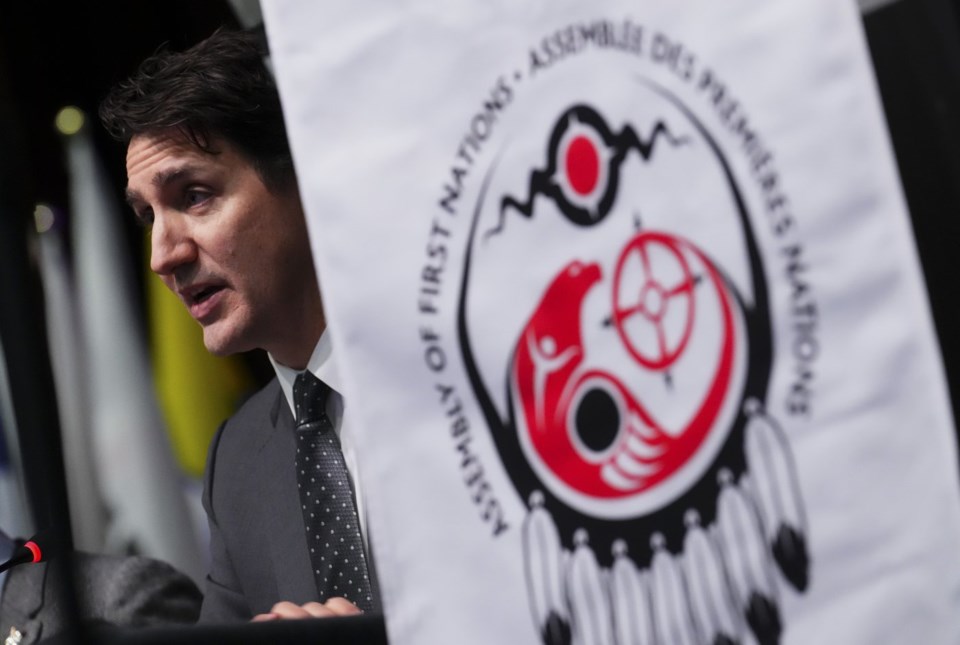OTTAWA ŌĆö Prime Minister Justin Trudeau did not commit to holding a national inquiry on systemic racism in policing Thursday morning even as he acknowledged the pain of First Nations mothers who have had to bury their children after an interaction with police.
Trudeau was addressing the Assembly of First Nations gathering in Ottawa two days after the chiefs passed a resolution calling for an inquiry into policing and police-related deaths.
That resolution came after nine First Nations people were killed in less than four weeks in August and September.
Three women whose sons and daughters died during or after an interaction with police made an emotional plea for the government to reform the RCMP.
"I've been waiting for this moment for four-and-a-half years," said Martha Martin, whose son and daughter died in 2020 after interactions with police.
"How many more of our people have to die by your police?" she said through tears as she stood at the microphone, addressing Trudeau and a handful of ministers.
"It's time to sit down with us, and it's time to start making changes."
Most attendees stood in support as she, Claudette Korchinski-Paquet and Edith Wells ŌĆö who lost their daughter and son after interactions with police, respectively ŌĆö demanded better for their families and others.
"Shame on sa╣·╝╩┤½├Į," one delegate shouted before Trudeau acknowledged the mothers, and said none of them should have had to bury their children.
"IŌĆÖm also committed to doing everything in my power as a government to try to fix this, to try to change and address the systemic discrimination," he said.
"WeŌĆÖre in a very, very imperfect world, and are reminded of it regularly."
Anishinabek Nation Grand Council Chief Linda Debassige called Trudeau's actions "cowardly."
She said by not committing to call an inquiry, he is allowing sa╣·╝╩┤½├Į to remain complicit in systemic discrimination.
"It's a clear indication that he does not support First Nations and their quest for the truth," she said.
Only after the inquiry will justice happen, she said, and until then First Nations people will continue to suffer.
Thursday marked the end of the three-day assembly, which focused heavily on reforming the child welfare system and the harms done by police in First Nations communities.
Canadian politicians often show up to the December assembly to pitch their case on why they're best suited to work with First Nations and take questions from chiefs.
While chiefs are often willing to hold leaders to account when they address the Assembly of First Nations, the dial was turned up more than usual, especially for NDP Leader Jagmeet Singh ŌĆö who is generally received warmly by chiefs who line up to take photos with him ŌĆö and for Trudeau, who campaigned in 2015 on building better relationships with Indigenous Peoples.
Singh spent a significant portion of his speaking time blasting Conservative Leader Pierre Poilievre for his record on Indigenous issues, and praised some of his MPs for their work.
Poilievre was invited to speak but did not.
After Singh spoke and the floor was opened up to questions, chiefs told him the Assembly of First Nations is not a campaign trail, and that reconciliation means action. Another chief said they have requested to meet with him but haven't received a response, which Singh apologized for.
"I'm trying to get out to as many nations as I can," he said. "Being on the ground is the best way to speak with and connect with the community."
Bloc Qu├®b├®cois Leader Yves-Fran├¦ois Blanchet addressed the assembly solely in French.
Mohawk Council of Kahnawake Grand Chief Cody Diabo confronted Blanchet, saying Quebec sees itself as a sovereign nation without respecting the sovereignty of First Nations.
"My ancestors were here while yours arrived on boats," said Diabo, to applause in the room.
"We can have a conversation about what our relationship should be, and how your people can start packing up."
Blanchet was booed when he told chiefs he is sensitive to the fact French people came to this land a few hundred years ago, but that they need to be aware of the current moment.
Trudeau, who was flanked by Justice Minister Arif Virani, Indigenous Services Minister Patty Hajdu, Crown-Indigenous Relations Minister Gary Anandasangaree and Northern Affairs Minister Dan Vandal, similarly bore the brunt of chiefs' frustrations.
The panel came to a close after taking six questions from chiefs, though several stood at the microphone.
After Trudeau and the ministers rose and attempted to leave, they were heckled by chiefs, after which they stayed for more questions.
This report by The Canadian Press was first published Dec. 5, 2024.
Alessia Passafiume, The Canadian Press



